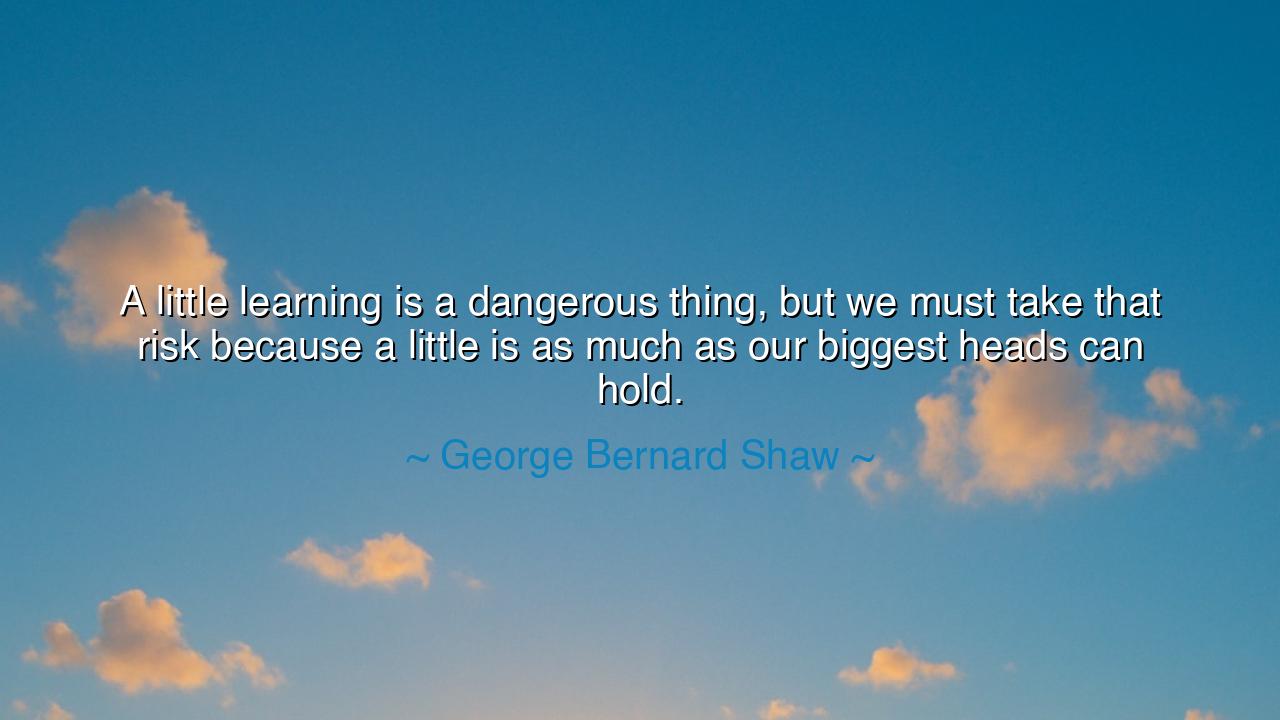
A little learning is a dangerous thing, but we must take that
A little learning is a dangerous thing, but we must take that risk because a little is as much as our biggest heads can hold.






When George Bernard Shaw wrote, “A little learning is a dangerous thing, but we must take that risk because a little is as much as our biggest heads can hold,” he spoke with the sharp wit and profound humility that marked all his reflections on human nature. Beneath the humor lies a truth both humbling and liberating — that human knowledge is limited, yet it is our sacred duty to seek it nonetheless. Shaw acknowledges that learning can lead to arrogance, misunderstanding, and error, but he also reminds us that ignorance is the far greater peril. To live, to think, to grow — these all demand that we risk being wrong. For though our minds are small, our striving to understand is what makes us noble.
This quote draws its first breath from the ancient warning of Alexander Pope, who said, “A little learning is a dangerous thing; drink deep, or taste not the Pierian spring.” Pope cautioned against shallow knowledge — against those who mistake fragments of truth for the whole. Shaw, however, twists this caution with irony and compassion. He admits that even the wisest among us can only ever drink “a little.” The ocean of truth is infinite, and we — fragile vessels of flesh and thought — can hold but a few drops. Yet, Shaw insists, we must still drink. The danger of learning a little is real, but the danger of learning nothing is ruinous. Thus, to learn, even imperfectly, is to be human.
In the ancient world, philosophers understood this same dilemma. Socrates, who was called the wisest of all Athenians, declared that his wisdom consisted only in knowing that he knew nothing. He did not flee from learning, nor did he boast of it. He walked the narrow path between ignorance and arrogance, knowing that every answer birthed a new question. Shaw’s words echo this eternal balance — between humility and courage, between awe and inquiry. To learn is to enter a temple where every truth opens into mystery. The danger, Shaw tells us, is not in the learning itself, but in forgetting our smallness before the vastness of the unknown.
There is a parable in this wisdom. Consider Isaac Newton, who uncovered the laws of motion and gravity and transformed the human understanding of the cosmos. Yet, at the end of his life, he said, “I do not know what I may appear to the world, but to myself I seem to have been only like a boy playing on the seashore... finding a smoother pebble or a prettier shell while the great ocean of truth lay all undiscovered before me.” Newton, one of history’s greatest minds, saw that even his brilliance was but a fragment of understanding. Shaw’s quote carries the same spirit: our “little learning” is both dangerous and divine, for it awakens us to the immensity of what we do not know.
And yet, there is courage in this acknowledgment. Shaw was not urging us to despair over our limitations, but to embrace them joyfully. The danger of a little learning can be mitigated by humility — by knowing that our knowledge is incomplete, and our wisdom always a work in progress. Learning, even if small, is the first step toward enlightenment. The flame may be small, but in darkness, even a spark gives light. The tragedy is not in having little wisdom, but in believing one has enough. The wise man uses his fragment of truth to seek the next; the fool builds a throne upon it.
In this way, Shaw’s quote becomes both a warning and a call to adventure. He warns us not to let our learning become pride, for pride is the death of inquiry. But he also calls us to dare the pursuit of knowledge, even knowing we can never reach its end. For what is life, if not an unending education? Every joy teaches gratitude; every sorrow teaches resilience. Even our mistakes become lessons, and our smallest insights — when tempered with humility — light the way for others. Thus, though “a little learning” may be dangerous, it is also indispensable; it is the peril through which all progress must pass.
The lesson, then, is clear: seek knowledge bravely, but wear humility as your armor. Do not scorn your ignorance, nor exalt your understanding. Know that your mind, vast though it seems, holds only a fraction of truth — and yet, that fraction matters. Read, listen, and question. Learn from the wise and from the foolish alike. And when you think you know, remind yourself that knowing is only the beginning. For the greatest minds are not those who claim certainty, but those who remain forever students of the world.
So let Shaw’s words live in you as a compass: risk learning, though it be dangerous; pursue wisdom, though it be endless. Accept that your mind is small — but let your curiosity be vast. The ocean of truth is infinite, but it is better to sail a small boat upon it with wonder than to stand forever on the shore of ignorance, fearing to set forth.






AAdministratorAdministrator
Welcome, honored guests. Please leave a comment, we will respond soon